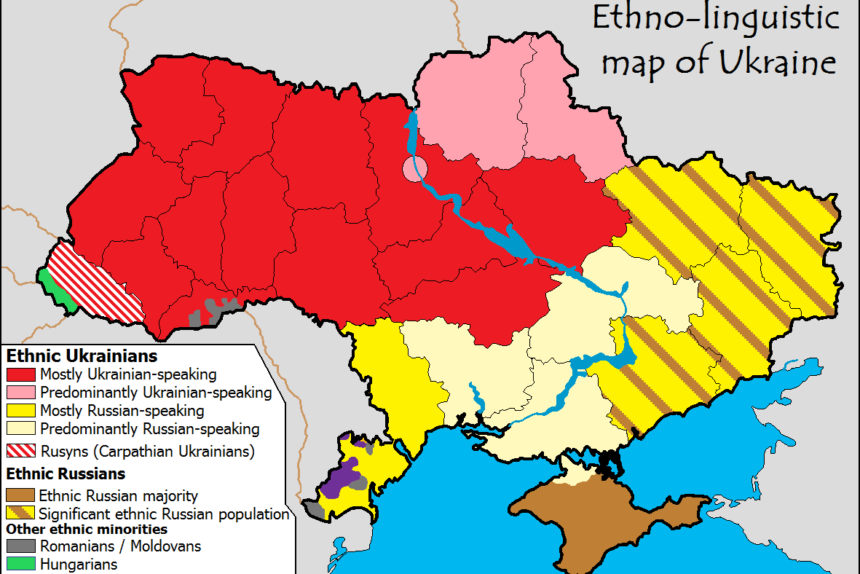I don’t speak Ukrainian, even though I am Ukrainian. My mother is Ukrainian with Polish roots; my father is Ukrainian with Romanian roots. They both speak the Ukrainian-Russian dialect, as do most of the older generation in my region. But I speak Russian.
The reason I speak Russian is that I was born and raised in the Donetsk region. According to the Ukrainian Census of 2001, 75 percent of the people in the Donetsk region speak Russian, 24 percent speak Ukrainian, and less than 1 percent speak something else.
Language is political in Ukraine. It is a huge problem, and it is being escalated not only by regular people but also by the mass media. Many people believe that there is an irrefutable connection between use of the Russian language and sympathy for the aggressor country, and that everybody who speaks Russian is automatically a separatist and a betrayer. This is ridiculous. It hasn’t reached the level of wide-open animosity yet, but what language you speak, and who hears you speak it, is something we now have to worry about. I’ve seen that unpleasant confrontations between Ukrainians over language are becoming more common.
Spelling is a political issue, too, such as how one spells Ukraine’s capital city in English, whether the Russian “Kiev” or Ukrainian “Kyiv.” Or, something as simple as my name, Olga, is spelled with a Russian “g” in some official documents, like my Ukrainian passport, but for some reason, other documents, like my international passport and credit cards, were issued with the Ukrainian spelling, “Olha.”
I never considered myself a minority, until the year 2014, when the Maidan coup ousted the pro-Russian president, Viktor Yanukovych. Since then, I understand that I am a part of a minority indeed, because of my language and roots—and this is fine by me. But being a modern, tolerant person who follows the law and respects other citizens, I’m curious about the attitude of my more intolerant compatriots: After you try to take away my language, will it then be my beliefs, then my home, and then my life?
I was raised speaking Russian and Ukrainian. At school and university, I studied Ukrainian, and I speak it better than most new patriots, but I’m more comfortable speaking Russian in my everyday life. I don’t mind people who have decided to switch to Ukrainian after having spoken their native language all their lives. I understand also that some people, when they are first transitioning to Ukrainian, make plenty of mistakes, and I accept this, too (though it hurts my ears!). After all, Ukrainian is the official language of our country. But people should also accept those of us who want to continue to speak our traditional language in everyday life. We live in a free country, right?
I live in Kharkiv, near the Russian border. Assimilation is a long journey, especially in border regions, where it takes a long time, even centuries. The same is true in the parts of Ukraine that border Poland, Moldova, Hungary, Slovakia, and Romania: there are specific dialects together with the pure languages of the neighboring countries and of Ukraine. And everybody speaks that language they feel most comfortable with, because it is part of their cultural identity. I speak Russian; but I am a loyal Ukrainian.
I just want to remind my countrymen about a couple of international documents which assert a right to one’s native language as well as one’s religious, political, and cultural beliefs. These are the Universal Declaration of Human Rights (1948) and the Declaration on the Rights of Persons Belonging to National or Ethnic, Religious and Linguistic Minorities (1992). A key provision of the latter document is that
Persons belonging to national or ethnic, religious and linguistic minorities … have the right to enjoy their own culture, to profess and practice their own religion, and to use their own language, in private and in public, freely and without interference or any form of discrimination. (Article 2.1)
What would you say if someone in Texas, for example, decided to forbid Spanish in everyday life? It’s crazy, right? Why shouldn’t people have the right to speak their native language, even if the official language is different? The same question can be asked in Ukraine.
Although words have the power to harm, such is not the fault of the language in which they are spoken. It doesn’t matter what language you speak, so long as you remain sane—which is hard enough, living in a war zone.
Image: Ethno-linguistic map of Ukraine (Yerevanci / via Wikimedia Commons, CC BY-SA 3.0)

Leave a Reply